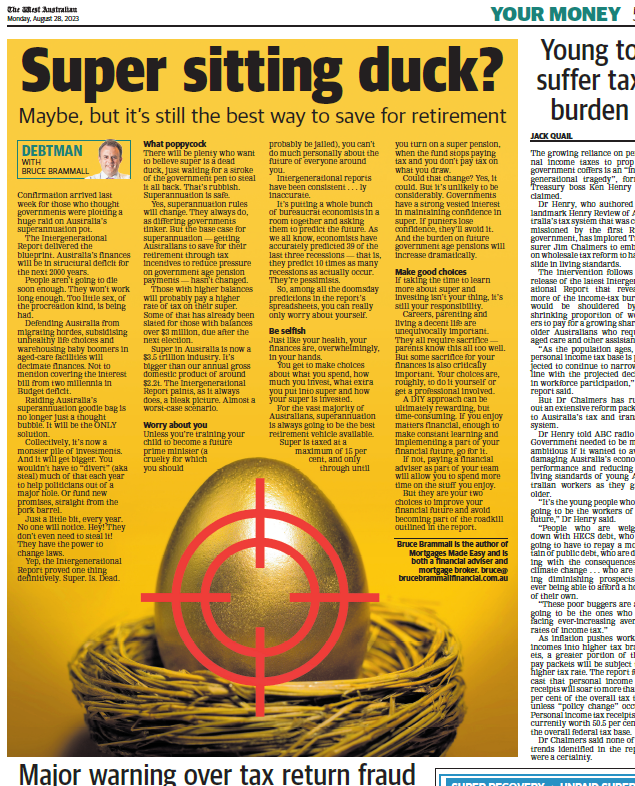
Bruce Brammall, The West Australian, 28 August, 2023
Debt Man
Confirmation arrived last week for those who thought governments were plotting a huge raid on Australia’s superannuation pot.
The Intergenerational Report delivered the blueprint. Australia’s finances will be in structural deficit for the next two thousand years.
People aren’t going to die soon enough. They won’t work long enough. Too little sex, of the pro-creation kind, is being had.
Defending Australia from migrating hordes, subsidising unhealthy life choices and warehousing Boomers in aged-care facilities will decimate finances. Not to mention covering the interest bill from two millennia in Budget deficit.
Raiding Australia’s superannuation goody bag is no longer just a thought bubble. It will be the ONLY solution.
Collectively, it’s now a monster pile of investments. And it will get bigger. You wouldn’t have to “divert” (aka, steal) much of that each year to help politicians out of a major hole. Or fund new promises, straight from the pork barrel.
Just a little bit, every year. No-one will notice. Hey! They don’t even need to steal it! They have the power to change laws.
Yep, the Intergenerational Report proved one thing definitively.
Super. Is. Dead.
What poppycock
There will be plenty who want to believe super is a dead duck, just waiting for a stroke of the government pen to steal it all back.
That’s rubbish. Superannuation is safe.
Yes, superannuation rules will change. They always do, as differing governments tinker. But the base case for superannuation – getting Australians to save for their retirement through tax incentives to reduce pressure on government age pension payments – hasn’t changed.
Those with higher balances will probably pay a higher rate of tax on their super. Some of that has already been slated for those with balances over $3 million, due after the next election.
Super in Australia is now a $3.5 trillion industry. It’s bigger than our annual gross domestic product (GDP) of around $2.2 trillion.
The IGR paints, as it always does, a bleak picture. Almost a worst case scenario.
Worry about you
Unless you’re training up your child to become a future prime minister (which is a cruelty for which you should probably be jailed), you can’t do much personally about the future of everyone around you.
IGRs have been consistent … ly inaccurate.
It’s putting a whole room of bureaucrat economists in a room together and asking them to predict the future. As we all know, economists have accurately predicted 39 of the last three recessions – that is, they predict 10 times as many recessions as actually occur. They’re pessimists.
So, amongst all the doomsday predictions in the IGR’s spreadsheets, you can really only worry about yourself.
Be selfish
Just like your health, your finances are, overwhelmingly, in your hands.
You get to make choices about what you spend, how much you invest, what extra you put into super, how your super is invested.
For the vast majority of Australians, superannuation is always going to be the best retirement vehicle available.
Super is taxed at a maximum of 15 per cent, and only through until you turn on a super pension, when the fund stops paying tax and you don’t pay tax on what you draw.
Could that change? Yes, it could. But it’s unlikely to be considerably. Governments have a strong vested interest in maintaining confidence in super. If punters lose confidence, they’ll avoid it. And the burden on future government age pensions will increase dramatically.
Make good choices
If taking the time to learn more about super and investing isn’t your thing, it’s still your responsibility.
Careers, parenting and living a decent life are unequivocally important. They all require sacrifice – parents know this all too well. But some sacrifice for your finances is also critically important.
Your choices are, roughly, to do it yourself, or get a professional involved.
A DIY approach can be ultimately rewarding, but time consuming. If you enjoy matters financial, enough to make constant learning and implementing a part of your financial future, go for it.
If not, paying a financial adviser as part of your team will allow you to spend more time on the stuff you enjoy.
But they are your two choices, if you wish to improve your financial future and avoid becoming part of the roadkill outlined in the Intergenerational Report.
Bruce Brammall is the author of Mortgages Made Easy and is both a financial adviser and mortgage broker. E: bruce@brucebrammallfinancial.com.au.